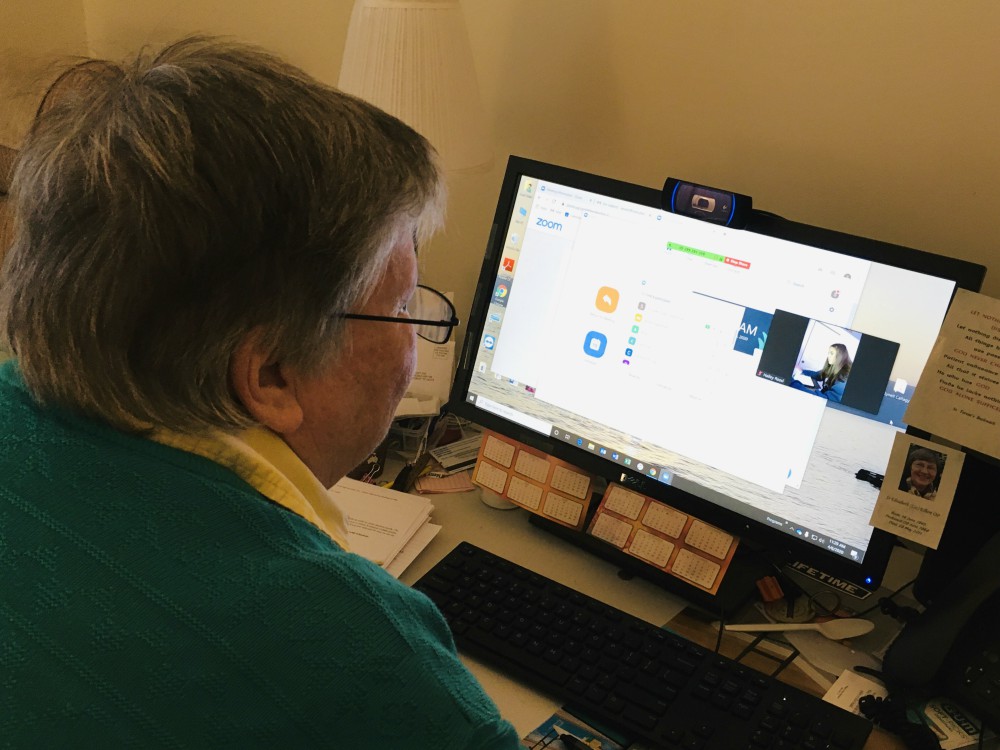
Mercy Sr. Jean Evans at her computer, "distance teaching" (Provided photo)
When I applied to be a substitute English teacher at Mercy High School in Burlingame, California, for the last 10 weeks of the school year, I had no idea that I'd be the one getting educated. I had taught English at Mercy, and now saw an opportunity to reconnect with girls and be a "sister presence" in the school while a freshman English teacher went on maternity leave.
On March 12, I sent my application and résumé to Mercy's assistant head of school for academics, Lauren Conklin, and in a few days met her and the English department head. After the interview, I was asked to give a demonstration lesson to a small group of students and that was arranged a few days later.
"I can do this," I said confidently to myself and prepared a worksheet for the audience present for my lesson: the current teacher, the head of department, the assistant head of school for academics, and seven Mercy girls. Everything was fine as I passed out their papers. The girls picked them up, looked at them and then began to do some serious scratching in their backpacks and pockets in search of pen or pencil. That obstacle overcome, we proceeded to the lesson. My reeducation was beginning: Everything is done on an iPad. NPR. (No Paper Required).
The class went very well, I thought, as we worked our way through Shakespeare's Sonnet 97. "How like a winter hath my absence been from thee ...", which I managed to reduce to the Girl Scout ditty: "Make new friends, but keep the old. One is silver, the other gold."
A few days before my official start date, March 26, I was encouraged to come to the freshman English classroom and sit in on classes. I would be "shadowing." The classroom was equipped with student desks perched on circular frames, rolling wheels attached. They are great for varied constellations and group work. I made an unsuccessful attempt to occupy a student desk, when it began rolling away from me. Opting for safety and comfort, I headed for the sofa in the back of the room.
As the teacher began her lessons on Shakespeare and Elizabethan theater, I marveled at the uses of the iPad. Where had I been all these years? Sitting on the wrong side of the digital divide for sure. By the end of the first day, I felt like I had been born in the Elizabethan era myself. Knowing I was technologically challenged, the class teacher prepared paper copies of tests and assignments to carry me and the students through to the semester's end. It would all work.
The one thing she didn't prepare me for came unbidden in my first week of teaching: the COVID-19 lockdown. Within a matter of three days, after one long session in the school library with the faculty (of which I was now a member), Mercy was ready to launch online teaching and learning.
Advertisement
Owing to the planning of the administration (wasn't that an inspiration of the Holy Spirit?), Mercy teachers had spent faculty time in November 2019 preparing for distance learning. This turned out to be the key to the school's successful adaptation to the new reality of education online while "sheltering in place."
"Thrown in the deep end" is a cliché, but in my case, it was true. After one or two sessions with the department head, it was time to meet the classes. Setting up a Zoom date and time for each class, notifying the students, preparing the lessons, assignments and assessments, and surviving the 80-minute periods was exhausting.
However, I can't say enough for the girls' patience and kindness to me. If the screen doesn't include everyone's face or the "Romeo and Juliet" video isn't loud enough, I get plenty of help. Classes begin with everyone signing into a Zoom meeting as we wait until each student's face or symbol appears on screen. There are occasional internet issues at home, but generally we all manage to see each other, that is, if I haven't forgotten to send a password, click on "Share Screen" or anything else.
When it's time for small group work on a project or classwork, we easily move to "breakout rooms." And it's possible to enter the room and see how the group is doing.
At times when I have been at a complete loss, my compassionate students offer possible solutions to every problem — they are so kind to this "senior." After a recent quiz, I was in a stew trying to plan how to give quiz papers back to my three classes studying "Romeo and Juliet." My solution was to scan the tests and email them back to the girls. One girl sent back a thank you — possibly surprised to get the test marked and sent back. I apologized for the delay and she remarked in an email, "No worries. All these apps can be very confusing."
As we go from face-to-face to screen-to-screen, moving as a school community through this never-to-be-forgotten "COVID-19 space," I thank God for the foresight and planning of our administrators and department heads, and for the acceptance and patience of my four classes of English. You're the best!
[Jean Evans is a Sister of Mercy from California who ministered for 28 years in South Africa, where she worked in Johannesburg with victims of the apartheid regime. Back in the U.S., she is currently doing substitute teaching, spiritual direction and grant writing.]







